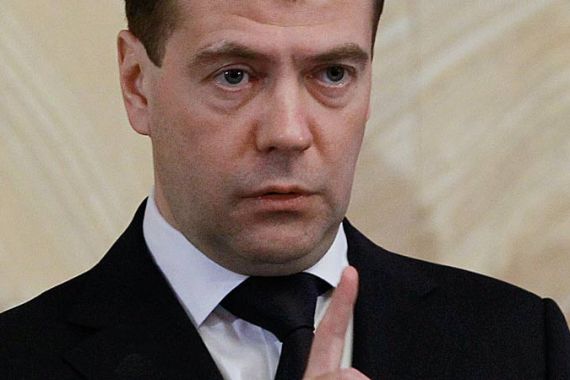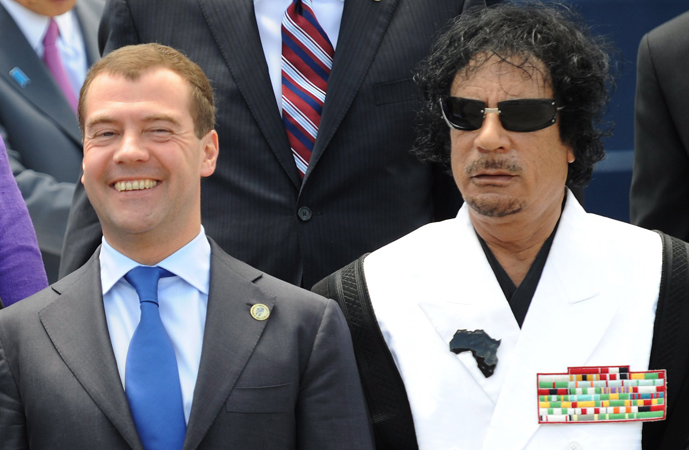Russia bans arms sales to Libya
In move reinforcing UN sanctions, Dmitry Medvedev signs decree halting all weapons sales to Libya.

 |
| Gaddafi and Medvedev in 2009, a year after the two discussed opening a Russian naval base in Libya [EPA] |
Russia has banned all weapons sales to Libya, effectively suspending its arms contracts with the government of
Muammar Gaddafi.
A Kremlin statement released on Thursday indicated that an order signed by Dmitry Medvedev, the Russian president, “bans the export from the Russian Federation to Libya as well as the sale, delivery and transfer… of all types of arms and related materials, including weapons and ammunition, combat vehicles and military hardware”.
Keep reading
list of 4 items‘We need you’: Solomon Islands’ support for US agency’s return revealed
Why are nations racing to buy weapons?
Parallel economy: How Russia is defying the West’s boycott
Although Russia is party to the UN resolution passed on February 26 that bans weapons sales to Libya, Al Jazeera’s Neave Barker, reporting from Moscow, said that the decree seemed to be a reinforcement of that embargo.
Russia, the world’s second-largest arms exporter after the United States, was one of the main suppliers of weapons to Libya.
Our correspondent said that the decree was seen as “perhaps a bold move forward for the Russians” as “Libya had been – in the second half of the 20th century, at least – the biggest buyer of Russian weapons anywhere in the world.”
A senior Russian arms official said last week the unrest in Libya had cost Moscow $4bn in arms deals.
The daily Kommersant newspaper cited a source last week as saying Russia had $2bn worth of arms contracts with Libya and was close to concluding deals to sell military aircraft and anti-aircraft missiles worth another $1.8bn.
The Kremlin said it would inspect any suspect cargo to and from Libya to ensure compliance with the ban.
Nato talks
Meanwhile Germany has frozen Libyan government bank accounts held in the country, according to the Reuters news agency.
It said the German economy ministry announced a freeze on accounts held by the Libyan central bank and the Libyan investment authority.
The move follows UN sanctions against Libya that Gaddafi’s global assets frozen in Britain, Canada, the US and Switzerland, and comes as Nato and EU officials are due to meet over the situation in Libya.
Politicians are discussing military, humanitarian and economic options in response to the crisis, including the possibility of a no-fly zone.
Italy, whose bases could play a critical role in any military intervention, has said it will back decisions taken by Nato, the EU or the United Nations.
Anders Fogh Rasmussen, secretary-general of the military alliance, said on Wednesday the bloc could “respond at very short notice” if requested, but that it was “not looking to intervene in Libya”.